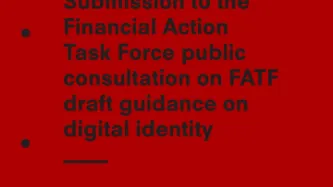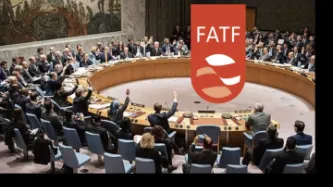Search
Content type: Advocacy
Privacy International welcomes this opportunity to submit comments to the FATF consultation. The draft recommendation is an improvement on existing guidance that we have reviewed.
We also welcome the calls of the FATF for accommodations that will relieve burdens upon individuals who are being excluded from the financial sector, as a result of the FATF’s prior recommendations.
PI believes that identity systems must empower people. The initial question surrounding the development of any…
Content type: News & Analysis
The global counter-terrorism agenda is driven by a group of powerful governments and industry with a vested political and economic interest in pushing for security solutions that increasingly rely on surveillance technologies at the expenses of human rights.
To facilitate the adoption of these measures, a plethora of bodies, groups and networks of governments and other interested private stakeholders develop norms, standards and ‘good practices’ which often end up becoming hard national laws…
Content type: Examples
After an 18-month investigation involving interviews with 160 life insurance companies, in January 2019 New York Financial Services, the state's top financial regulator, announced it would allow life insurers to use data from social media and other non-traditional sources to set premium rates for its customers. Insurers will be required to demonstrate that their use of the information doesn't unfairly discriminate against specific customers. New York is the first state to issue specific…
Content type: Examples
In 2015, the Swedish startup hub Epicenter began offering employees microchip implants that unlock doors, operate printers, and pay for food and drink. By 2017, about 150 of the 2,000 workers employed by the hub's more than 100 companies had accepted the implants. Epicenter is just one of a number of companies experimenting with this technology, which relies on Near Field Communication (NFC). The chips are biologically safe, but pose security and privacy issues by making it possible to track…
Content type: News & Analysis
http://www.spiegel.de/international/world/how-the-nsa-spies-on-international-bank-transactions-a-922430.html*Update: The European Parliament has voted to recommend suspension of its Terrorist Finance Tracking Program (TFTP) agreement with the US. The vote in favour of suspension only highlights how the NSA’s reported activities have undermined the agreement. Negotiations should immediately commence to strengthen the privacy and redress provisions, to ensure that governments…
Content type: News & Analysis
Dear Mr Schrank,
I am writing with regard to the current controversy over the private arrangement between SWIFT and the U.S. Government that facilitates the extradition of confidential financial transaction data from SWIFT to U.S. authorities. You will be aware that Privacy International contends that this arrangement breaches privacy and data protection law, and we have lodged complaints with regulatory authorities in 38 countries.
In my many discussions with SWIFT officials over the past…
Content type: Long Read
On June 22-23 2006 the New York Times ran a story uncovering an international financial surveillance programme run by the Bush Administration. In essence the Bush Administration is getting access to international transfer data and storing this in databases at the Treasury Department and/or CIA for access to investigate terrorist activity.
There are a number of inconsistencies in the accounts so far:
The U.S. claims that this is a narrowly focused programme that is compliant with the law,…





